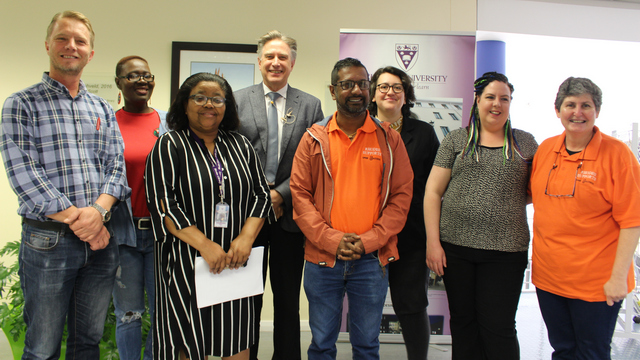
By Julian A Jacobs, PhD candidate, School of Journalism and Media Studies
Dr Peter Clayton, Deputy Vice-Chancellor for Research and Innovation, officially opened Rhodes University’s Open Access Day on 20 November 2019 at the Main Library.
Rhodes University became a signatory of the Berlin Declaration on Open Access to Knowledge in the Sciences and Humanities on 24 October 2013, ten years after it came into effect. Over 470 research and higher education institutions globally have become signatories of this initiative since its inception in 2003. All of these institutions committed to ensure that 90 percent of the scholarly research literature is published with an open access model, in order to exploit the innovative and transformational potential of open access.
Dr Clayton echoed these sentiments and was pleased with the strides Rhodes University has made in relation to making its scholarly literature available on open access networks. “Open access is a reality now and it is truly global. It also has greater significance for the global south as a whole,” he said.
The Centre for Higher Education Research, Teaching and Learning’s (CHERTL) Dr Nicola Pallitt shared an introduction to creative commons licensing and the concept of openness more broadly.
“There are many kinds of ‘open’ and it really depends on which ‘hat’ you’re wearing as part of your scholarship,” she said. She shared examples of open scholarship from her own work which included the creation and adaptation of open educational resources, open educational practices and open pedagogies related to her teaching and open access publishing as a researcher. She assured attendees that they should not feel overwhelmed by the possibilities and encouraged colleagues to make their teaching and research work open using various practical strategies.
One such strategy was that researchers investigate from publishers about whether they may share pre or post-print versions of their journal articles via the institutional repository and other platforms such as Research Gate or Academia.edu. “We need to make our work accessible to everyone and to use platforms where we can reach others,” she said. Her presentation slides are available here.
Dr Roza Carvalho, a Rhodes University alumna, spoke about the African Journals Online (AJOL) platform, which provides free access to abstracts of thousands of articles, and free access to full text articles from its AJOL Open Access journal partners.
AJOL hosts 524 peer-reviewed African published journals, with 261 classified as Open Access. AJOL's vision is for African learning to be translated into African development and its mission is to increase online visibility, access and use of African-published research output in support of quality African research and higher education. Dr Carvalho emphasised that important areas of research in Africa are not necessarily covered by publications from the developed world and that African countries need to collectively play a greater role in the global online scholarly environment.
African researchers also need access to their own continent's scholarly publications. Mainly due to difficulties accessing them, African-published research papers have been under-utilised, under-valued and under-cited in the international and African research arenas. Journals published from developing countries are still largely excluded from the major, commercial-indexing companies based in the developed Global North. It is often said, as a result, that African research is invisible, or that there is very little of it. AJOL proves that this is not true. "There is a global appetite for peer-reviewed African research. Open Access research on our platform has a massive reach,' Dr Carvalho stated.
The annual event at the Rhodes University library is geared not only towards raising the awareness of Open Access, but for the adoption of Open Scholarship as the preferred model for scholarly communication by our academic community.

